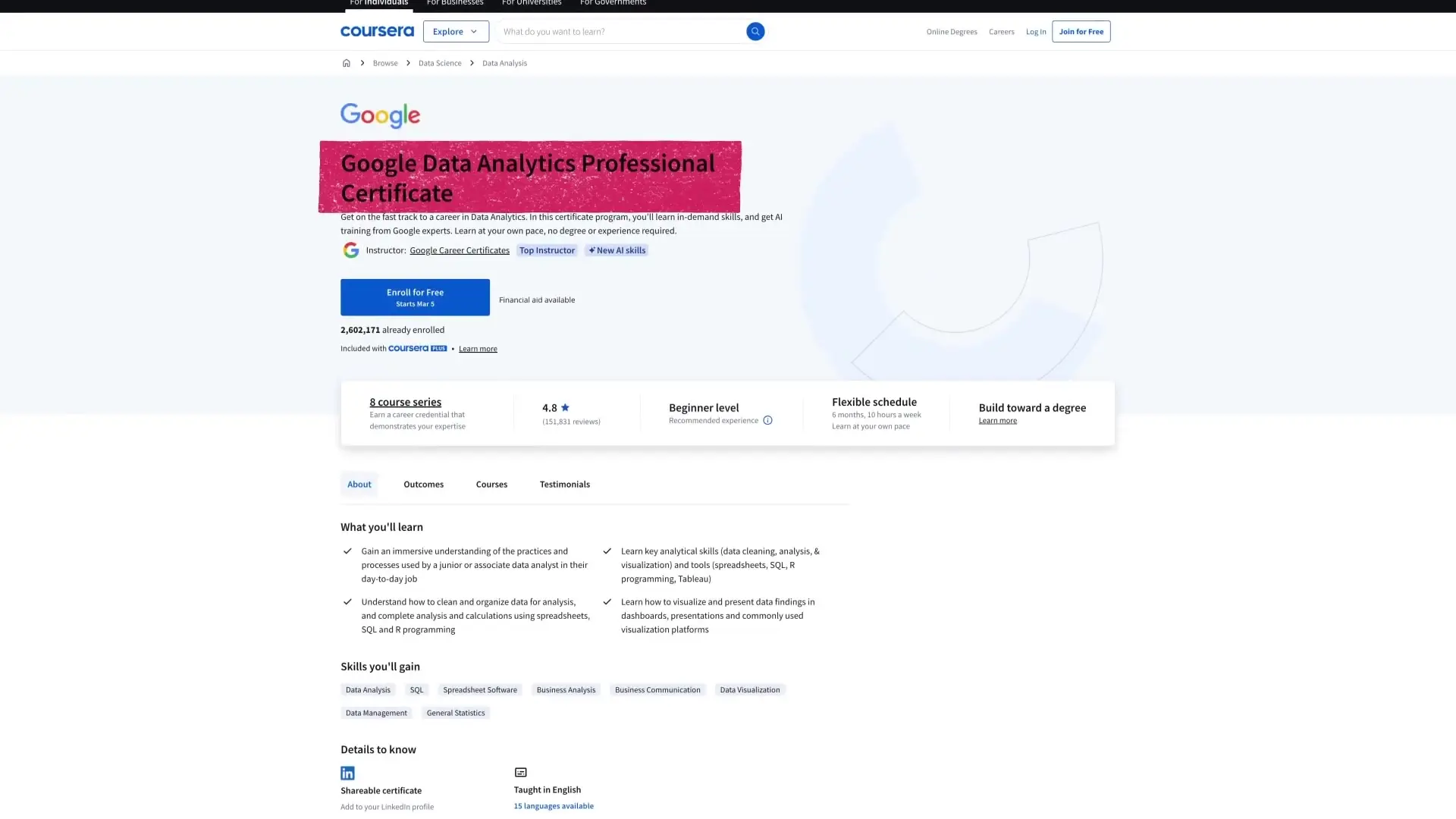
With countless online learning platforms available today, many professionals and students wonder if Coursera still deserves their time and money. Having used Coursera extensively for over five years, I've gained valuable insights into what makes this platform both powerful and potentially problematic for different types of learners.
5 Key Advantages of Learning on Coursera
Before diving into the limitations, let's explore what makes Coursera stand out in the crowded online education market.
1. High-Quality Content from Trusted Partners
Contrary to what some might assume, Coursera doesn't create courses itself. Instead, it partners with leading organizations like Google, Microsoft, and prestigious universities to deliver their educational content. This partnership model ensures that many courses offer industry-relevant curriculum developed by recognized experts in their fields.
The public review system encourages these partners to maintain high standards—poorly rated courses quickly lose visibility, incentivizing organizations to invest in quality content development. Before enrolling in any course, check the ratings (aim for 4+ stars) to ensure you're getting the best educational experience.
2. Diverse Learning Options for Different Goals

Coursera offers several distinct learning formats to match your specific goals:
- Individual Courses: Focused learning on specific skills or topics (e.g., Excel fundamentals)
- Specializations: Series of related courses providing comprehensive knowledge in a broader subject area (e.g., Data Analysis with Excel)
- Professional Certificates: Career-focused programs combining multiple courses with job preparation resources, portfolio development, and interview preparation (e.g., Google Data Analytics Certificate)
- Degrees: Full academic programs in partnership with universities
When selecting content, consider this pattern I've observed: courses from companies like Google often emphasize practical job skills, while university-created courses typically provide stronger theoretical foundations. This distinction can help you choose the right content based on whether you're seeking immediate workplace applications or deeper conceptual understanding.
3. Flexible Pricing and Financial Accessibility
Unlike many educational platforms that lock all content behind paywalls, Coursera allows you to audit most courses for free. While certificates and graded assignments require payment, you can access video lectures and reading materials at no cost.
For those who need financial assistance, Coursera offers aid covering up to 90% of course costs. This makes quality education accessible to learners from diverse economic backgrounds. The subscription model (Coursera Plus) can also provide excellent value for those taking multiple courses.
4. Self-Paced Learning for Busy Professionals
One of Coursera's greatest strengths is its flexibility. The self-paced format accommodates unpredictable schedules, allowing you to learn when it's convenient. This is particularly valuable for working professionals whose available study time may fluctuate dramatically from week to week.
Unlike traditional education with rigid schedules and deadlines, Coursera lets you progress at your own pace. This removes a significant barrier for many people who want to advance their skills but can't commit to structured class times.
5. Career Resources Beyond Course Content

Many learners overlook Coursera's career development resources. Professional certificate programs, in particular, include valuable job preparation tools like resume reviews, interview preparation, and career guidance. These resources can be just as valuable as the course content itself, especially if your primary goal is employment or career advancement.
5 Limitations to Consider Before Investing in Coursera
Despite its many advantages, Coursera isn't perfect for everyone or every learning situation. Here are the key limitations to consider:
1. Inconsistent Course Quality
While many Coursera offerings are excellent, quality varies significantly across the platform. Some courses feature high production values, engaging instruction, and well-designed assessments, while others fall short in these areas. Always check reviews before enrolling, and be wary of courses rated below 4.5 stars.
2. Overwhelming Course Selection
Paradoxically, Coursera's vast library can become a disadvantage. With thousands of courses available, it's easy to become distracted by interesting but ultimately irrelevant options. For someone pursuing a specific career goal like data science, perhaps only 1% of the available courses are truly relevant to their path.
This abundance can lead to what I call "course-hopping"—starting multiple courses but finishing few of them. To avoid this trap, create a focused learning plan before browsing the catalog, and resist the temptation to enroll in courses outside your core objectives.
3. Certificate Collection Syndrome
The satisfaction of earning certificates can become addictive, sometimes at the expense of practical skill development. While certificates document your learning journey, they shouldn't become your primary goal. At certain points in your career development, your time might be better spent building projects, creating a portfolio, or gaining hands-on experience.
Remember that Coursera is just one component of a comprehensive learning strategy. Balance formal courses with practical application to maximize your professional growth.
4. Limited Practical Exercises in Some Courses
Many Coursera courses emphasize video lectures and reading materials over hands-on practice. This approach makes courses more accessible and enjoyable for most learners, but it can limit skill development in fields where practice is essential.
To overcome this limitation, supplement your Coursera learning with additional practice resources. For programming courses, platforms like W3Schools offer free interactive exercises that can reinforce concepts learned on Coursera.
5. Limited Personal Support

At Coursera's price point, you shouldn't expect personalized mentorship or intensive coaching. While community forums and peer feedback are available, they don't replace the guidance of a dedicated instructor. This self-directed approach works well for independent learners but may leave others feeling unsupported.
If you struggle with self-motivation or need more personalized feedback, consider supplementing Coursera with a mentor or study group. Some learners find success by pairing affordable Coursera courses with occasional sessions with a paid tutor or coach.
Is Coursera Worth It? The Final Verdict
Coursera offers exceptional value for certain types of learners and learning objectives. The platform excels at providing affordable, flexible access to quality educational content from respected institutions. For self-motivated learners with clear goals, it can be an invaluable resource.
However, Coursera is not a complete replacement for more intensive educational experiences like bootcamps or degree programs (unless you're enrolled in one of Coursera's full degree offerings). It works best as part of a broader learning strategy that includes practical application and, ideally, some form of mentorship or community.
Coursera Is Likely Worth It If You:
- Are a self-motivated learner who can maintain discipline without external pressure
- Have specific learning goals and can avoid distractions
- Need flexible scheduling due to work or other commitments
- Want to learn from industry leaders or prestigious universities at an affordable price
- Are supplementing other learning methods or already have some foundation in your field
Coursera May Not Be Worth It If You:
- Struggle with self-motivation and need structured accountability
- Learn best through intensive hands-on practice with feedback
- Require personalized guidance and mentorship
- Need recognized credentials that carry significant weight with employers in your field
- Have limited time and need a highly focused curriculum without extra content
Before investing significant time or money in Coursera, take advantage of the free audit option to experience courses firsthand. This will help you determine if the platform's teaching style and format align with your learning preferences.
Remember that the most effective learning often combines multiple approaches. Coursera can be an excellent foundation, but for maximum career impact, pair it with practical projects, networking, and real-world application of your new skills.
Let's Watch!
Is Coursera Worth It? 5 Pros & Cons Before You Invest
Ready to enhance your neural network?
Access our quantum knowledge cores and upgrade your programming abilities.
Initialize Training Sequence